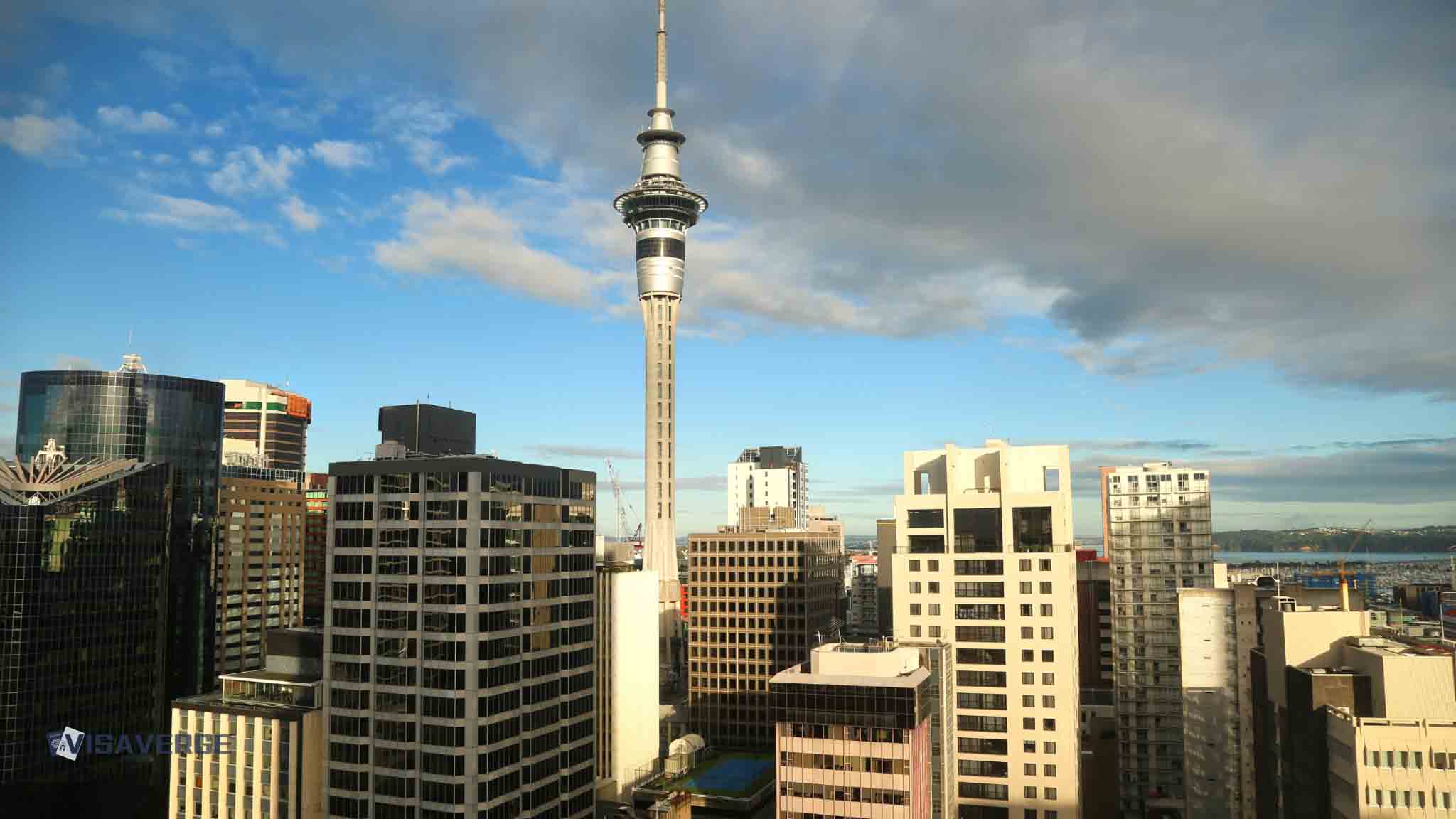Key Takeaways
• 65 golden visa applications since April 2025, 55 from U.S. citizens driven by anti-Trump sentiment.
• New Zealand reduced investment to NZ$5M, removed English test, cut residency to 21 days over 3 years.
• Australia closed similar visa; New Zealand attracts investors seeking safety, quick processing, and government trust.
In recent months, New Zealand 🇳🇿 has drawn strong attention from wealthy individuals around the world who are seeking safety, security, and stable government. The driver behind the latest surge in “golden visa” applications is mainly political. Experts, such as Stuart Nash, former immigration minister for New Zealand 🇳🇿, have stated clearly that many applicants from the United States 🇺🇸 are motivated by opposition to President Trump and the uncertainty his return to the White House brings. With the golden visa program’s new relaxed rules, the program has become even more appealing for those with financial means, especially those with anti-Trump views who now want another home country for themselves and their families.
This analysis from VisaVerge.com discusses why many Americans are choosing New Zealand 🇳🇿, explains the major program updates, presents recent application statistics, compares global alternatives, and highlights what this means for both investors and New Zealand 🇳🇿. The report draws only on facts and statistics found in the referenced sources.

Summary of Key Findings
- Most new applications to the New Zealand 🇳🇿 golden visa program are coming from wealthy Americans, largely driven by anti-Trump sentiment and worries about political stability in the United States 🇺🇸.
- New Zealand 🇳🇿 updated its golden visa program in April 2025, making the rules easier: lower investment, no English exam, shorter required stays, and a fast, simple process. Uptake has been quick since these changes.
- The number of American applications has sharply increased, following earlier trends after recent U.S. elections.
- This shift comes as other options, such as Australia’s golden visa, disappear.
- New Zealand 🇳🇿 stands out for its personal safety, trust in its government, and stable society, which are attractive for those who are politically disillusioned elsewhere.
Why Politically Disaffected Americans Prefer New Zealand 🇳🇿
The “golden visa” is an investor residency program that lets high-net-worth people gain the right to live in a country by making a large investment there. In New Zealand 🇳🇿, recent program changes now make it one of the simplest and most attractive options for those with the financial means and the desire to settle abroad. President Trump’s return to the White House—his re-election, as explained by Stuart Nash, a former immigration minister—has caused widespread concern among Americans who disagree with his policies or are uneasy about his approach to global organizations like NATO.
Nash explains: “President Trump’s re-election is the main driver.” In addition to political motivations, applicants look for a safe and peaceful place where they can enjoy a good quality of life and have faith in their government. These applicants see New Zealand 🇳🇿 as offering what their home country no longer does: safety from unrest, respect for the rule of law, and a peaceful environment for families and investments.
Lifestyle, Security, and Political Stability
Apart from political factors, many wealthy individuals are drawn to New Zealand 🇳🇿 because it is widely viewed as one of the world’s safest, cleanest, and most peaceful countries. The nation enjoys a stable parliament, low crime levels, and strong institutions. This reputation is especially appealing to those who fear rising instability, both in the United States 🇺🇸 and other regions around the world. For families looking for a calm, orderly, and attractive lifestyle, New Zealand 🇳🇿 comes out ahead of many other possible destinations.
Major Changes to the New Zealand 🇳🇿 Golden Visa
The resurgence in interest isn’t just political. In April 2025, New Zealand 🇳🇿 made targeted changes to the golden visa (also called the “investor residency”) program to attract more global capital. These changes make the program easier for more people:
- The minimum investment for the “growth” category was lowered from NZ$15 million to NZ$5 million (about US$3 million). This opens the program to people with lower but still large amounts of available investment.
- English language tests are no longer required, making it easier for applicants of all backgrounds.
- The minimum stay in New Zealand 🇳🇿 has been cut from three years to just 21 days across a three-year period, removing a big hurdle for frequent travelers.
- The government has sped up the process: applications are processed in 11 days on average—a much shorter time than in the past.
- A “balanced” visa category was also introduced. This option requires a minimum of NZ$10 million, but offers more flexibility, letting investors put money into bonds, stocks, or property development. Importantly, family members can benefit from residency as well.
Key Features of the Current Golden Visa—Summary Table
Here is a simple comparison of the main program options:
| Feature | Growth Category | Balanced Category |
|---|---|---|
| Minimum Investment | NZ$5 Million (US$3M) | NZ$10 Million |
| Residency Requirement | 21 days over 3 years | 105 days over 5 years |
| Language Requirement | None | None |
| Processing Time | ~11 days | ~11 days |
Visualization: If you were to plot applications per month since April 2025, there would be a very steep spike, especially in the first six weeks after the rule changes. Almost all applications—55 out of 65—are from citizens of the United States 🇺🇸, and the rest come mainly from Hong Kong 🇭🇰 and China 🇨🇳.
Application Surge Since the New Rules
Numbers show a remarkable surge since the April 2025 changes:
- There have been 65 new golden visa applications, with 55 from United States 🇺🇸 citizens.
- Other countries are far behind: Hong Kong 🇭🇰 had just 15, and China 🇨🇳 had 12 in the same period.
- When including rollover applications (those begun under older rules but carried forward), at least NZ$620 million has already been committed through this program within six weeks of the reforms.
- After the latest U.S. election, online interest soared: Google searches about moving to New Zealand 🇳🇿 jumped almost 20 times in one day, and consultants fielded four times the usual number of inquiries about golden visas from Americans.
Another way to visualize this data: if you drew a pie chart of golden visa applicants by nationality, it would be more than two-thirds United States 🇺🇸, with much smaller slices for Hong Kong 🇭🇰 and China 🇨🇳.
What Makes New Zealand 🇳🇿 Attractive Compared to Alternatives?
Several countries have offered golden visas before, often in Europe or other parts of the world, but not all programs are equally open right now:
- Australia 🇦🇺 had a similar investor visa scheme, but it has now closed. This leaves New Zealand 🇳🇿 as the top choice for people looking for a secure safe haven in this region.
- Unlike many European programs, the New Zealand 🇳🇿 investor pathway does not allow purchasing existing homes or property. Instead, applicants must invest in business ventures, start-ups, or managed investment funds that boost the local economy.
- Investors looking for residency options that include the ability to buy real estate might find this limitation surprising, but New Zealand 🇳🇿 aims to avoid the housing problems caused by investor demand in many cities elsewhere.
Fast Process and Low Barriers
A major draw to the current New Zealand 🇳🇿 golden visa is its fast, simple, and clear process:
- Documents are generally reviewed in under two weeks, well below the time seen in most countries offering similar investor schemes.
- No English language test means that investors from around the world feel comfortable applying.
- Families benefit because dependents—spouses and children—can get residency rights as well, although the options for bringing elderly parents are not mentioned in the program details cited.
Comparison to Previous U.S. Election Years
Trends seen in 2025 repeat patterns from earlier U.S. election cycles. When political shifts or changes in the White House occur, wealthy Americans often look for backup options overseas. For example, after voting closed in the most recent election, Google searches for “move to New Zealand” skyrocketed, and lawyers reported a sizable increase in clients with anti-Trump or anti-political instability concerns. Now, with lower investment requirements and simpler entry, New Zealand 🇳🇿 is capturing most of those looking for an offshore safe harbor.
Implications for New Zealand 🇳🇿 and Investors
For New Zealand 🇳🇿, the updated golden visa is meant to bring in new investment that supports local business rather than overheats the already expensive housing market. For investors, especially those taking an anti-Trump stance or simply worried about rising political tensions worldwide, the program offers both a potential escape and a practical second residency.
However, not everyone will qualify—these are high-stakes applications aimed at individuals with millions of dollars to invest. This means, in practice, that the program serves mainly wealthy, mobile people, such as investors, business owners, and sometimes celebrities or tech sector professionals.
Program Limits and Considerations
Like all government residency programs, there are aspects for potential applicants to be aware of:
- Investors must be able to prove the legal source of their funds and pass New Zealand 🇳🇿’s background checks.
- Investments must be kept in active growth or balanced assets; simply moving money to a New Zealand 🇳🇿 bank account doesn’t qualify.
- The 21 days of required presence (over three years) is very low, which makes it possible for applicants to live mostly elsewhere if they wish.
- Critics sometimes question if the program is fair, since it is only open to very wealthy people, and some question whether it will affect the country’s social fabric. On the other hand, the government is able to direct new capital toward areas it wants to grow.
Potential Future Trends
As New Zealand 🇳🇿 continues to adjust its golden visa program and awareness spreads among global wealthy communities, yet more applications from the United States 🇺🇸 and other countries can be expected. Some analysts say that if President Trump’s policies become even more divisive or if other countries like Canada 🇨🇦 or the United Kingdom 🇬🇧 temporarily restrict their own investor programs, demand for New Zealand 🇳🇿 residencies could rise further.
While it is too soon to tell exactly how many people will move—or how many will choose to stay long term—early statistics point to a lasting rise in interest, especially when politics in the United States 🇺🇸 remain unpredictable for some.
Limitations of the Data
While the application numbers are clear, a few limits still exist in the available facts:
- Since the program has only recently changed, there is not yet data on overall approvals, rejections, or how many families actually settle long-term in New Zealand 🇳🇿.
- Figures on rollovers and precise breakdowns by program option are not provided.
- Reports only count applications, not the total number of people per application, so the full impact on population is unclear.
- The program is still new under these rules; economic impact will take more time to measure.
Methodology
All data and statistics in this report come directly from public and official sources referenced at the end, as well as specialist publications cited in the introduction. Application numbers reflect counts reported by New Zealand 🇳🇿 government agencies and international news outlets. Google search data is drawn from public web search trend records.
For official and up-to-date details on the New Zealand 🇳🇿 investor visa, readers are encouraged to refer to the Immigration New Zealand official website.
Conclusion: What This Means for Investors and New Zealand 🇳🇿’s Golden Visa Program
The surge driven by anti-Trump sentiment reflects a clear link between political upheaval in the United States 🇺🇸 and growing demand for New Zealand 🇳🇿 residence among the global elite. Fast processing, urgent global risks, and the closing of similar schemes elsewhere have made New Zealand 🇳🇿 the standout choice for those with millions to invest. Early program figures confirm a sharp American spike in applicants, building on similar bursts seen after previous U.S. elections.
By making the golden visa program easier, New Zealand 🇳🇿 has positioned itself as the new leader in the global race for investor residents—particularly those with political or social concerns at home and high expectations for personal and family security abroad.
As policy shifts continue and more applicants look to New Zealand 🇳🇿 as a backup plan, only time will tell how the program shapes the country’s economy and social landscape. For now, interest in the golden visa is strong and shows no sign of stopping, at least as long as global political fears and anti-Trump motivations drive the world’s wealthy to seek a second home.
For more information or to learn about the application process, visit the government’s official golden visa page.
Learn Today
Golden Visa → A residency program allowing investors to live in a country by making significant financial investments.
Investor Residency → A visa category granting residence rights to individuals investing specified amounts in the host country.
Residency Requirement → The minimum period an applicant must physically stay in the country to maintain visa validity.
Balanced Category → A golden visa option allowing investment in diverse assets with more flexible residency rules.
Political Disaffection → Lack of support or opposition to a government influencing decisions to seek residency abroad.
This Article in a Nutshell
New Zealand’s golden visa program surged after April 2025 changes, attracting wealthy Americans opposing Trump. Lower investments and fast processing make it a premier choice for political safety and stable residency abroad, with record applications showing its growing global appeal among elite investors seeking peace and security.
— By VisaVerge.com
Read more:
• Friedrich Merz’s immigration policies face criticism in new global report
• Supreme Court focuses on process in key immigration cases this year
• Immigration raids in Nashville disrupt classrooms as student absences rise
• Immigration Court sets new record for asylum decisions and denials
• US immigration authorities deport migrants to South Sudan despite court order













